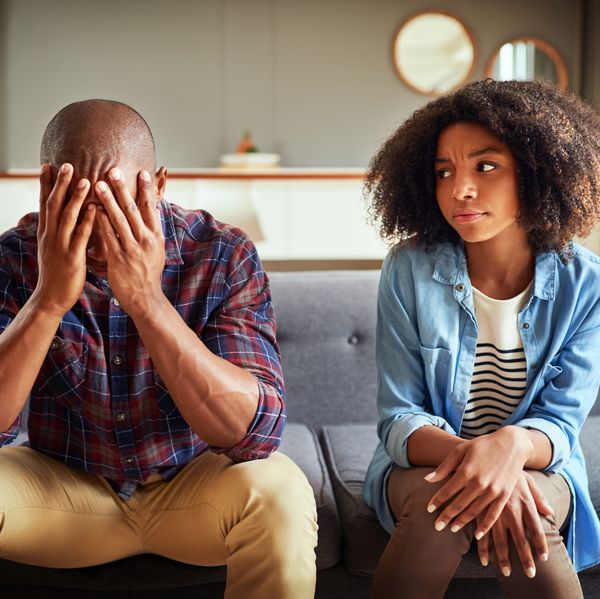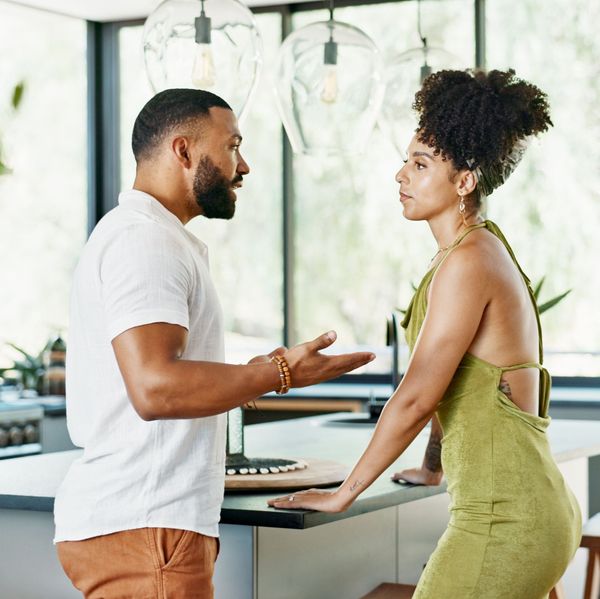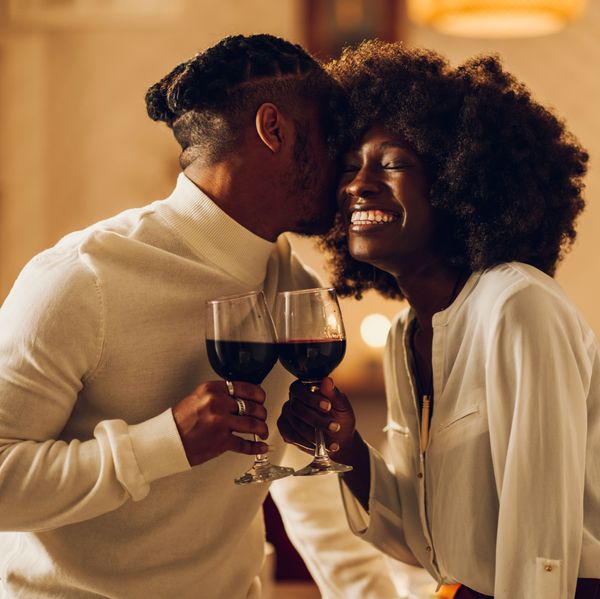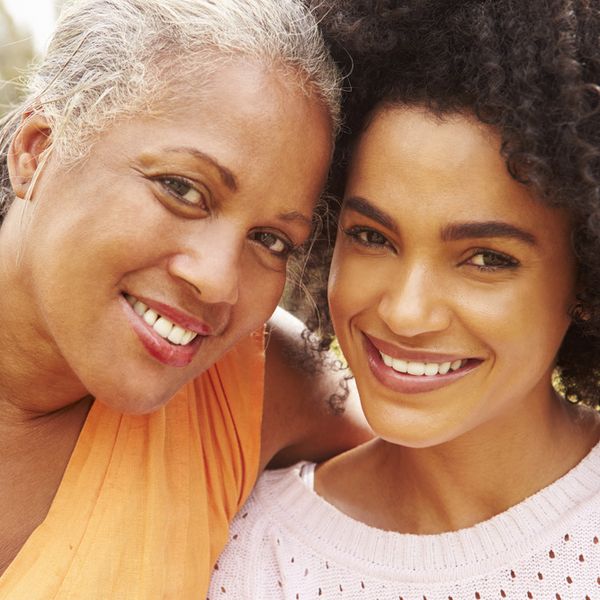
The place where I typically go to see movies is inside of a mall. Well, as I was walking towards the theater on opening weekend of The Photograph, I saw something that immediately brought tears to my eyes. First, I noticed a Black man with some long beautiful locs that were pinned up. He had on a coat like my New Yorker great-grandfather used to wear, so that already brought a smile to my face. But as I passed by him, about 15 or so feet away, I then noticed a little girl who was around 4. She was absolutely adorable but what especially caught my attention was how she first jumped up and down in one place, then she clapped her hands and laughed, then she ran as fast as she could. When I turned around to see where she was going, guess where it was? To the arms of the man with the beautiful locs. A few feet behind her was a pretty Black woman with a grin on her face. When I asked if the man was her husband, she proudly nodded. I looked her dead in the eye and said, "That is so dope." She smiled, said, "Thank you", as I replied, this time with more intention, "No. It really is." She smiled even bigger.
When I turned back around towards the little girl who was still safely in the arms of her father—who is married to her mother—he was kissing her all over her face, she was giggling, and they were laughing together. Oh. Even as I am typing this, tears are welling up. Every time I've told the story since, it has emotionally resonated with the listener. I'm not sure if it's due to how sacred and special Black love is, because those of us who really "get it" know that that little girl is off to a great start when it comes to having healthy relationships with Black men…or because how so many of us wish that moment in time could've been a part of our own childhood experience. Not just one part of what I shared either; all of it. Maybe it's a little bit of everything I just said, wrapped up into one.
A few days later, as I watched episode three of Cherish the Day, and it unpacked how both love interests had so much dysfunction to deal with when it came to their parents, in many ways because their parents acted like children, I reflected on how so many of us can relate to what it's like to have to deal with the PTSD that comes directly from feeling like we were more mature and self-aware than our own parents were while growing up. And so, I thought it might be helpful to offer some tips on how to heal if you felt like you had to "raise your parents" as a child. I pray that it will.
Does It Feel Like You Had to Raise Your Parents As a Child? Here's How to Get Through It.
Be Clear About What You Were Deserving Of
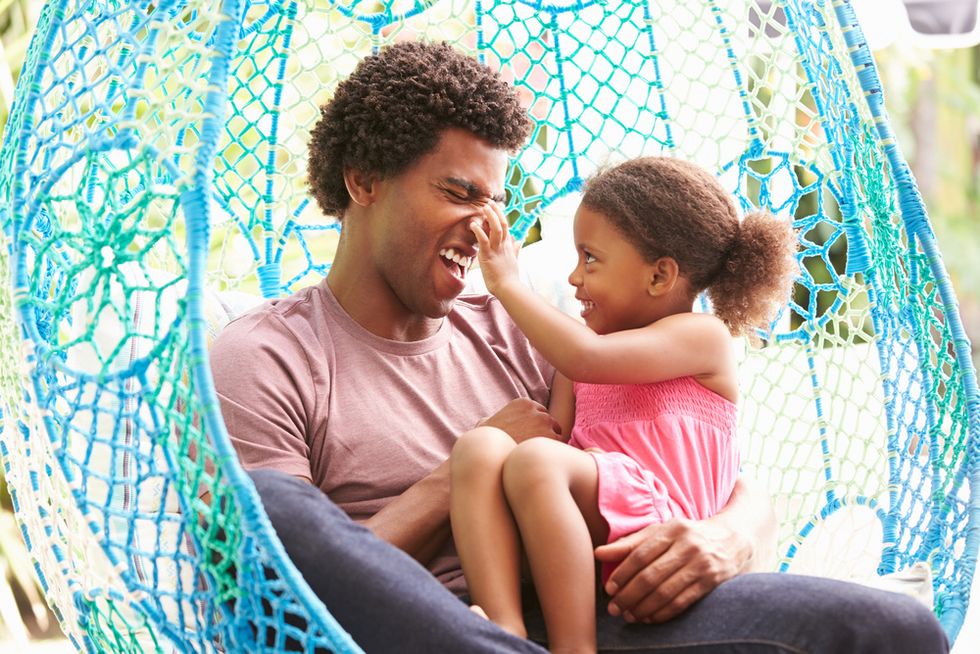
I've got a male friend who, on so many levels, is pretty damn awesome. But when it comes to matters of the heart, he absolutely sucks. On the surface, people would probably chalk it up to him being a selfish commitment-phobe, but I know more of the backstory. Even though he is pretty much a middle child, he is honored as the patriarch. His father is the epitome of being a rolling stone. His mother has some deficiencies that has caused her to be way too dependent on my friend, all throughout his life. His siblings basically treat him like an ATM guru. As a result, he doesn't really see having a family of his own as being a blessing; it's more like a burden. And so, he keeps a wall up to prevent having one from ever manifesting. What's really sad is when I try and tell him that he deserves more than what he is settling for, he doesn't truly get where I am coming from; that's because he didn't grow up understanding what parents are supposed to do—and not do. Not fully, anyway.
If reading all of that just triggered you in some way and you're looking at your monitor or cell phone screen like, "I'm not sure I know either", allow me to provide a brief rundown.
Children deserve:
- To feel safe and protected
- To have their needs provided for
- To have their feelings validated
- To not be violated, in any way
- To receive unconditional love and support
- To be respected as individuals and human beings
- To not be abused, in any way
- To not have to compensate for where their parents are lacking
- To know, and hopefully have a relationship with, BOTH of their parents
- To be raised in an environment where they can thrive, comfortably, in the stages of their development
Hmph. I don't know if it's a "good" or "bad" thing that I didn't have to look any of that up. It flowed naturally because, some of this, I didn't have myself. Lacking these types of things forces children to, not only grow up faster than they should, but to a certain extent, have a warped perception of reality. Why? Because, while in some areas, they are probably wise—or at least knowledgeable—beyond their years, as a direct result of not receiving these things, they are emotionally stunted as well. If they don't get a hold of this reality as adults and do some of the following steps, it can create a vicious cycle of attracting someone similar to them and then doing to their own children what was done to them—even if every fiber of their being swears that they won't. That's why it's so important to pinpoint where you didn't get what you needed from your parents and then do the next step.
Tend to Your “Inner Child”
You can read articles like "Childhood abuse may stunt growth of part of brain involved in emotions", "Sexual and Emotional Abuse Scar the Brain in Specific Ways", "'You grow up hating yourself': why child abuse survivors keep – and break – their silence" and see, just how damaging child abuse is.
But here's the thing—even if your parents didn't physically or sexually abuse you, if you had to nurture them more than they ever nurtured you, that is also a form of abuse. And, if you don't acknowledge that within yourself, there can continue to be areas where you are not as developed as you should be, even now. Why? Because, while you were growing up, you were so busy trying to "take care of your parents"—whether that was emotionally, relationally, financially or otherwise—that you weren't able to fully evolve into a whole being.
I can totally relate. Aside from the abuse that I experienced (not every day but consistently, if that makes sense), I was constantly my parents' on-call therapist. Always listening to their problems and, quite frankly, hearing about stuff that was absolutely none of my business. That puts a weight and burden on children like no other. In hindsight, I think I was able to handle it because I was born to counsel. Still, that doesn't mean I was supposed to do it for grown ass people when I was still a little person. Tending to whatever their "emotional emergencies" were caused my own needs to get neglected and invalidated—a lot. And so, I've had to spend quite a bit of time learning how to tend to the areas of me that were neglected. In fact, something that my season of abstinence has taught me is some of my destructive relationships were all about looking for men to "tend to my inner child" since my parents didn't do the best job at it.
The little girl still needed to be tended to, even as an adult.
That's why I think it's important to remember that, where you feel ignored, dismissed or lacking—don't ignore those spaces. Listen to her. Tend to her. Love on her. Those areas don't exist for no reason. Know what else? They won't go away simply because you want them to.
Do a Little Family History Investigating
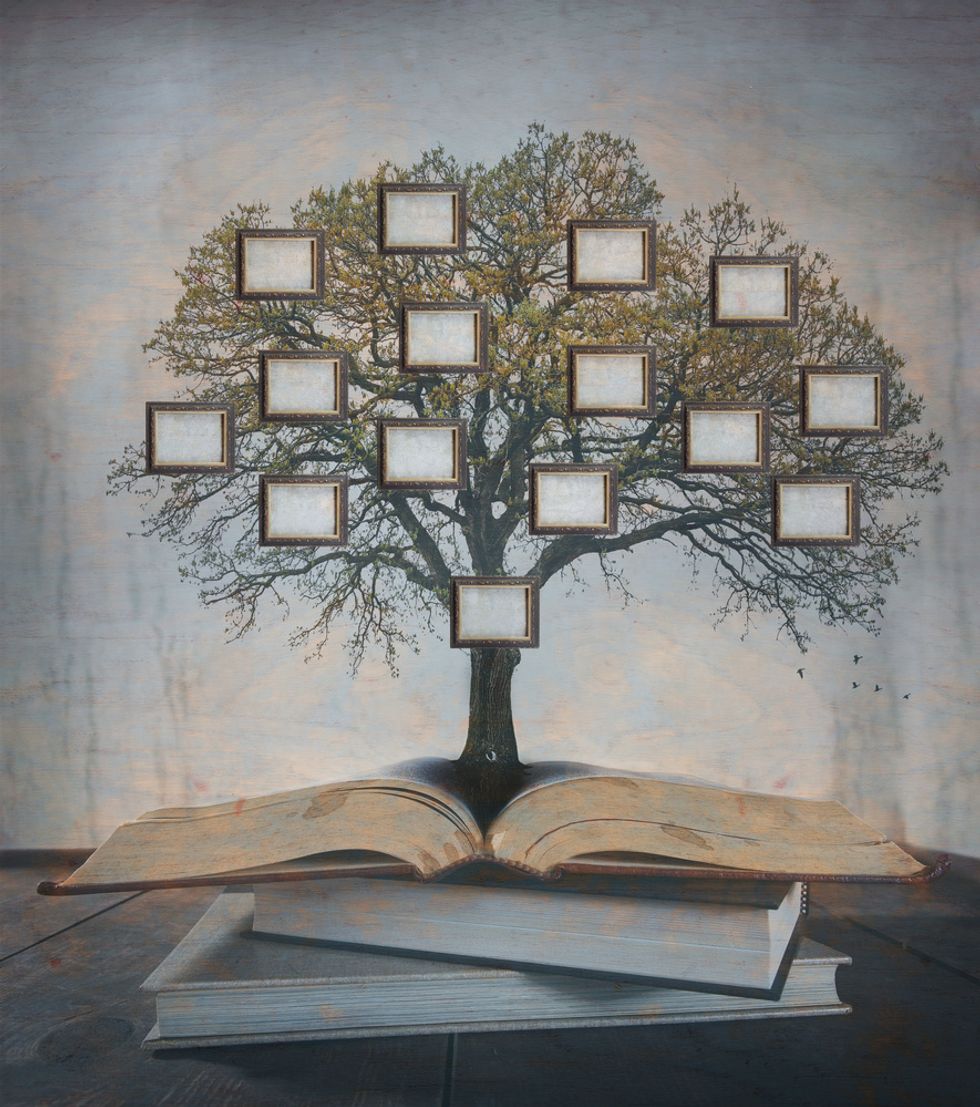
Something that has been both painful and intriguing to watch is this season of Growing Up Hip Hop. What has kept me tuning in is actually tied into this article title—"Damon Dash Storms Out After Heated Therapy Session with His Kids Goes Off the Rails (Exclusive Video)". We all know that reality television is, well, reality television, but I personally believe the wounds and pain between Damon Dash and his kids runs deep. Very deep. When I put my life coach hat on, I think that Damon is still so pained from the rejection and disrespect that he felt during his Roc-A-Fella Records days that his perception of respect is extremely skewed. He pops off. He doesn't listen. He disrespects in the process of trying to get respect; even his own children. But you know what? A lot of parents are like that. And it oftentimes has little to do with their kids; they are simply their sounding board—or punching bag.
For years, I used to wonder why my parents said and did some of the things that they did. But when I climbed up the family tree a bit and also did some relative interviewing, have mercy, did some things make sense. It's hard to be a functional parent when your own parents, grandparents, etc. were dysfunctional. Knowing some things about your family history won't justify your childhood, but it can help to explain some things. It can give you insight that may grant your own parents a little mercy while also helping you to be clear on what to do, and not do, in your own life—and with your own kids.
Confront Your “Demons”
Suffering in silence. Is that not what a lot of us, especially within the Black community, have been taught to do? Yeah, don't do that. Pain isn't meant to be suppressed.
That's why, whenever I read a news story with a (in this case, I'm being hypothetical) headline like, "A man kills a woman for cutting him off in traffic" or "A woman kills her child for eating too much cereal", I tend to be like, "Yeah, that's clickbait." It has nothing to do with traffic or food; it's about years of pain that has gone unaddressed that has finally hit the surface.
Sometimes, after sharing some of what I've been through, folks will be like, "It's a miracle that you're sane." Indeed, it is. But a part of the "miracle" is that I call the ish out. I talk and write about it. I've confronted the ones who've wronged me so that, again, my "inner girl" knows that she was not overlooked.
Listen, I'm not saying to call your mom after reading this and cuss her out. All I'm saying is if, when you think about your mom (or dad), there is some resentment, a conversation should probably be had at some point. If you don't address what you're feeling or thinking, there is a huge possibility that you're going to take it out on someone—or many people—who have done absolutely nothing to you. And that is not right. Or fair. Confrontation is like an exorcism for childhood demons. It's a way to keep them from ever haunting you. So is this next step.
Seek Therapy
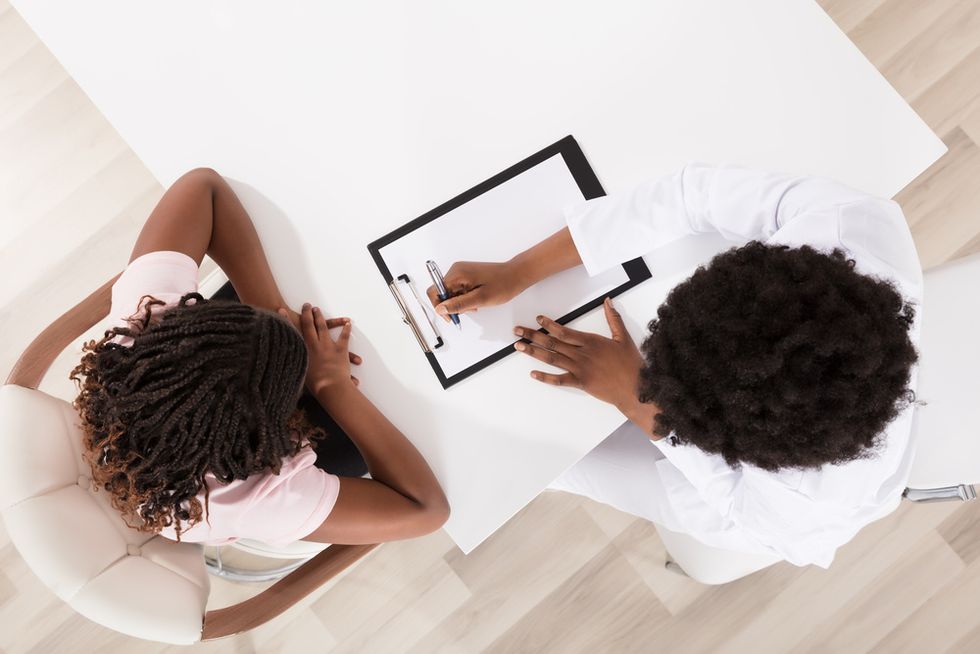
There is a Scripture in the Bible that says, "The way of a fool is right in his own eyes, but he who heeds counsel is wise." (Proverbs 12:15—NKJV) When I watched Joe Budden and Big Sean's Pull Up interview and they touched on the importance of therapy, it was evident that they both have gotten some. While I am fully aware that there continues to be a stigma when it comes to the importance of therapy, it's imperative to remember that the word not only means "the treatment of disease or disorders, as by some remedial, rehabilitating, or curative process", it also means "a curative power or quality". Y'all, therapy is powerful.
Case in point. I used to be a house poet at a venue here in Nashville. When I read the article, "Why the Black Community Has a Fraught Relationship with Therapy", I recognized someone who was also a house poet there. Her name is Monica A. Coleman. Back then, we were in our 20s (which automatically comes with various emotional roller coaster rides), yet while Monica was always brilliant and kind, there were oddities about her that didn't make sense (to me). I read the article and realized that she battled with depression. She even wrote a book entitled Bipolar Faith. Therapy is a part of what helped her get to a place of clarity, hope and healing.
No one is weak for going to therapy. Reputable therapists, counselors and life coaches can provide tips, tools, advice and insight from an "outside looking in" perspective that you might not reach any other way. If you know that you keep hitting mental, emotional and relational roadblocks that are directly tied to your childhood, seek help.
Remember, therapy is a CURATIVE POWER. There is absolutely nothing to be ashamed or fearful of when it comes to doing something that is designed to empower you.
Forgive
Whew. I say it often because it's the truth. I am still working on what forgiveness is all about. It's the late writer Oscar Wilde who once said, "Children begin by loving their parents; after a time, they judge them; rarely, if ever, do they forgive them." Hmph. There is some truth to that, I must admit. But I think a big part of why that is the case is when you forgive but you keep having to forgive for the same offense, it starts to make you hate forgiveness as much as you hate what you are forgiving someone for. It's like it sends the message that forgiving the "offender" is giving them permission to offend you again (make sense?). And so, we figure that if we don't forgive, we won't be hurt or harmed (because those two words are not exactly the same thing) anymore.
From a spiritual standpoint, that's dangerous because the Bible tells us that, in order to be forgiven by God, we must forgive others (because a lot of us forget that we "offend him on the regular" too—Matthew 6:14-15). Yet, deeper than that, I think it's important to understand that forgiving someone is not about surrendering to their abuse, offenses or dysfunction. Forgiving them is about releasing them from what they have done and not damaging yourself by harboring ill-will about it. Reconciliation, however, is another matter entirely.
As a child, when you had to act as the parent, you had no choice but to keep taking…and taking…and taking whatever dysfunction that came your way. Now, when your mom says, "I'm sorry you had to listen to all of my drama" or your dad says, "I'm sorry that you were left to figure out things that I should've handled for you" and you respond with, "I forgive you"—what you are essentially saying is, "For both of our sakes, I'm not going to hold that in. But what I am going to do, that I couldn't do at the time, is set some boundaries." As you should.
Set Firm Boundaries
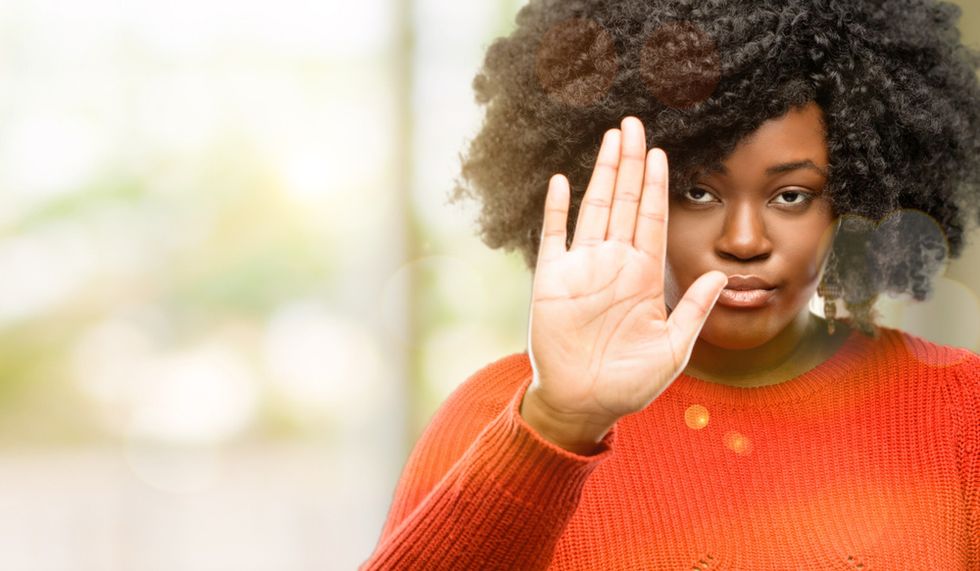
An article that I wrote for the site last year that was like a shot heard around the world is "Why You Should Be Unapologetic About Setting Boundaries With Toxic Family Members". Boundaries are limits and any parent who acted more like the child than the adult while they were supposed to be actually raising their kids mostly definitely needs limits. Limits simply convey that you can't do whatever, whenever—just because you think that you can. Or should. A good parent knows that being older than their adult child doesn't give them the right to control or be overbearing. Toxic parents on the other hand? They totally don't get this point. Hence, the need for boundaries with them…right? It's kind of like what a wise person once said—"If someone throws a fit because you set boundaries, it's just more evidence the boundary is needed."
That Cherish the Day episode that I talked about earlier? There was a scene where Gently's (the female lead) mom called and told her to give her money for a bus ticket. How twisted is it that Gently's mother thinks she is "grown enough" to tell her daughter to pay for her travel but she's not grown enough to pay for the ticket herself? A healthy parent would ask for help, not demand it. And get this—if Gently said "no", she would be well within her rights. She's an adult now. Adults can say "no". To any other adult. Again, healthy people know that. It's toxic ones who don't.
Break the Cycle
Aside from the fact that all of these steps can be liberating for you, it can also spare your own family (or future family) a repeat of your upbringing. After all, it's hard for any adult who is still an emotional child due to their own trauma to "train a child up in the way they should go" (Proverbs 22:6). How can they, when they don't know how? When they say, "hurt people, hurt people", it rings so true when it comes to generational curses. Heal yourself, not just for you—but for the ones who will come after you.
If you feel like you had to raise your parents and no one acknowledged that fact, I do. I am so sorry that had to happen to you. Trust me, there is a way to go from merely being a survivor to thriving. Take the time needed to heal. So that your little girl can grow up in every area that she deserved to. That you deserve to.
Want more stories like this? Sign up for our newsletter here and check out the related reads below:
The Relationships In Your Life That Are Desperately In Need Of Boundaries
What If It's Your Parents Who Happen To Be The Narcissists?
We've Said A Word About Toxic Fathers, But Who's Talking About Toxic Mothers?
Healing Toxic Relationships: Tiffany Haddish Says Forgiving Her Mom Gave Her The Closure She Needed
Feature image by Shutterstock
This Is How To Keep 'Holiday Season Stress' From Infecting Your Relationship
Hmph. Maybe it’s just me, but it seems like there is something really weird happening in the fall season air (because winter doesn’t officially begin until December 21) that cuddle season is in full swing while break-up season is as well. In fact, did you know that break-ups are so popular during the holiday season that December 11 is deemed Break-Up Day?
The reasons why relationships shift around this time vary; however, I did both roll my eyes and chuckle when I read that a very popular one is because it’s an easy way to get out of getting one’s significant other a Christmas present. SMDH.
Anyway, I personally think that the less shallow folks out here may contemplate calling things “quits” or they at least distance themselves a bit from their partner (and what I’m referring to is serious relationships) due to all of the stress and strain that oftentimes comes with the holidays whether it be financial, familial, due to their tight schedules or something else.
Listen, I would hate for you and your man to miss the fun and happiness of experiencing this time of year, all because you are so overwhelmed or irritated that you can’t really enjoy it. That’s why I have a few practical tips for how to avoid allowing the typical holiday season stress from INFECTING your relationship.
Manage Your Expectations
 Giphy
GiphyUnmanaged expectations. If there is a main reason why the holiday season tends to be so stress-filled for so many people, I’d bet good money that this is the cause. And when you’re in a long-term relationship, expectations can manifest themselves in all sorts of cryptic and/or unexpected ways. You might have relatives who assume that you are going to be with them for Thanksgiving or Christmas when you have other plans in mind. You might be thinking that you are going to spend one amount for presents while your man is thinking something totally different. When it comes to scheduling, your signals may be crossed.
And you know what? To all of these scenarios, this is where clear and consistent communication come in. Don’t assume anything. Don’t dictate anything either. From now until New Year’s, mutually decide to check in once a week, just to make sure that you are both on the same page as it relates to the holidays and what you both are thinking will come along with it. The less blindsided you both feel, the less stressed out you will be. Trust me on this.
Set (and Keep) a Budget
 Giphy
GiphyOkay, so I read that last year, 36 percent of Americans incurred some type of holiday-related debt. Hmph. Last year, there was still some sense of normalcy in this country, chile, so I can only imagine what finances are gonna look like over the next several weeks. That said, since I don’t know a lot of people who don’t find being broke stressful, make sure that you and your bae set a budget and then stick to it this year — no ifs, ands or buts.
Because really, y’all — it doesn’t make sense to deplete savings and/or max out credit cards for a few days of giggles only to be damn near losing your mind because you don’t know how to make ends meet come Dr. Martin Luther King, Jr. Day.
And by the way, this tip doesn’t just speak to things like food and gifts; I also mean travel. If it doesn’t make a ton of sense (or cents) to be all over the place this year — DON’T BE.
Keep Matthew 5:37 at the Forefront
 Giphy
GiphyIf off the top of your head, you don’t know what Matthew 5:37 says, no worries, here ya go: “But let your ‘Yes’ be ‘Yes,’ and your ‘No,’ ‘No.’ For whatever is more than these is from the evil one.” That verse right there? Oh, it’s a boundaries lifesaver! I say that because do you see “maybe” or “I’ll think about it” in there? Nope. LOL. It says that you should tell people “yes” or “no” and leave it at that — and that complements Anne Lamott’s quote, “’No’ is a complete sentence” impeccably well. Yeah, you’ve got to remember that anything beyond a yes or no to a request is privileged information; you don’t owe anyone details or an explanation.
Besides, if you are really honest with yourself, when someone asks you something and you give a “Umm, let me think about it” kind of reply, more times than not, you already know what your answer is going to be — so why not let you both off of the hook? Give your response. Commit to that. And let everyone (including yourself) get on with their lives and schedules.
I promise you that when it comes to those holiday parties, you are pissing more folks off by not RSVP’ing or doing so and not showing up than just saying, “Thank you but not this year” off the rip.
Remember That Your Personal Space Is Privilege Not a Right
 Giphy
GiphyA friend of mine recently bought a new house and invited me over to come see it. He’s a single man with no children, so as I was taking in all of the space that he had, especially as I walked through his finished basement, I joked about relatives coming to live with him. “Hell no” and “absolutely not” were pretty much his immediate responses as he went on to say that some folks even had the nerve to be offended when he told them that he had no intentions on taking DNA in.
Ain’t it wild how people think that your stuff is their right? And yes, that brings me to my next point. Your home is your sanctuary space. If you want to host folks this year — cool. If not, ALSO COOL. Please don’t let folks (family included) guilt you into how they want you to act or even into what they would do if the shoe was on the other foot. You are not them — and as one of my favorite quotes states, “If two people were exactly alike, one of them would be unnecessary.” (A man by the name Larry Dixon said that.)
Hell, my friends? They know that I am good for sending them random things that they need or even want all throughout the year. Coming over to hang out at my pace, though. Uh-uh. Chalk it up to being a card-carrying member of the ambivert club yet I like keeping my living space personal — and I sleep like a baby, each and every night, for feeling that way.
Always remember that your space, your time, your resources, your energy and shoot, yourself period (including your relationship), are all things that are your own. You get to choose how, when and why you want to share them. The holiday season is certainly no exception.
Cultivate Some “You Two Only” Traditions
 Giphy
GiphyIt’s not uncommon for some couples to hit me up after the holiday season to “detox.” Sometimes it’s due to the financial drama (and sometimes trauma) that they experienced. Sometimes it’s because they allowed their relatives (especially in-laws) to get more into their personal business than they should’ve. More than anything, though, it tends to be because they didn’t get enough quality time together and so ended up feeling “disconnected.”
Please don’t let that happen. Listen, I’m not even a holidays kind of woman and yet, I will absolutely sit myself down with some hot chocolate and chocolate chip cookies to enjoy a Hallmark holiday film or two. Aside from the fact that most of them are lighthearted and sweet, I also like that they usually focus on couples loving on each other amidst all of the holiday beauty and ambiance — which is something that all couples should set aside some time to do.
Maybe it’s a vacation. Maybe it’s a staycation. Or maybe it’s my personal favorite, A SEXCATION. Whether it’s for a few days, the weekend or even overnight — don’t you let the holidays go by without setting aside time for you and your man to celebrate one another. Don’t you dare (check out “Are You Ready To Have Some Very Merry 'Christmas Sex'?”).
GET. SOME. REST.
 Giphy
GiphyI once read that 8 out of 10 people get stressed out over the holidays and 3 out of 10 lose sleep during to it — and when you’re stress-filled and sleep-deprived, that can absolutely lead to hypersensitivity, making mountains out of molehills and even not being in the mood for sex.
Your relationship can’t afford to go through any of this, so definitely make sure to prioritize rest. I don’t care how unrealistic it might seem during this time, sleep should never be seen as a luxury; it will always and forever be a great necessity.
That said, try to get no less than six hours of shut-eye in (check out “6 Fascinating Ways Sex And Sleep Definitely Go Hand In Hand”) and even ask your bae to take a nap with you sometimes (check out “Wanna Have Some Next-Level Sex? Take A Nap, Sis.”). Not only will sleep help to restore your mind, body and spirit but, when it’s with your partner, it’s an act of intimacy that can make you both feel super connected, even in the midst of what might feel like chaos.
___
Holiday season stress is real. Still, never give it the permission or power to throw your relationship off. Put you and your man first and let the holidays be what they are gonna be, chile.
Let’s make things inbox official! Sign up for the xoNecole newsletter for love, wellness, career, and exclusive content delivered straight to your inbox.
Featured image by Shutterstock
How To Avoid Being An Emotionally Impulsive Spender This Holiday Season
Geeze. Can you believe that we are just a few days out from another Christmas? Yeah, me neither. In fact, because I’m not a holidays person myself (check out “So, What If You Don't Observe Holidays?”), it wasn’t until one of my clients was venting about how stressed out she was due to all of the holiday season procrastinating that she had been doing that I realized just how fast December is actually flying by.
If, like her, you’re feeling frazzled because, although you told yourself last year that you weren’t going to wait until the last minute to “handle your business,” you ended up doing exactly that, fret not. I’ve got 10 tips that can keep you from making emotionally-triggered decisions as far as your financial expenses are concerned. Merry Christmas. #wink
1. Create a Budget. Stick to It.
 Giphy
GiphyBudgets, boy. I recently read that one of the reasons why they don’t work for a lot of people is because many folks don’t have a clue about how much money they spend on a monthly basis to begin with. SMDH. That said, at the end of the day, it’s important to remember that a budget is simply setting boundaries/limits on your spending — and being intentional about moving in this fashion is always a wise move; especially when it comes to this time of the year…especially being that it’s typical for half of all Americans to take on some type of holiday season debt with 17 percent needing six (or more) months to pay it off.
Know what can prevent this kind of financial chaos? A SPENDING BUDGET. Tips for how to create one of your own this year can be found here.
2. Never Shop When You’re Stressed or Pressed
 Giphy
GiphyYou know how they say that it’s not a good idea to go grocery shopping when you’re hungry? Although the holiday season can be a stressful time, avoid shopping for gifts (or décor or food for recipes) when you are feeling stressed out or pressed for time. More times than not, that cultivates anxiety which could cause you to either purchase things that you don’t really want or to spend money that you don’t really have (P.S. If you’re relying on credit cards, that qualifies as money that you don’t really have. Just sayin’).
3. Don’t Keep Up with the Joneses
 Giphy
GiphyKnow something else that can stress you out: trying to keep up with the Joneses. And y’all, now that we have social media, the reality is that envy is at an all-time high. That’s because it can be really easy to watch holiday engagements, holiday trips and folks bragging about the things that they’ve received in times past, only for you to find yourself wishing that you were them — or putting pressure on yourself and those in your world to keep up.
Listen, it is King Solomon who once said, “So are the ways of everyone who is greedy for gain; It takes away the life of its owners” (Proverbs 1:19 — NKJV) and “A sound heart is life to the body, but envy is rottenness to the bones” (Proverbs 14:30 — NKJV) and he’s considered to be the wisest man who ever lived (during his time — I Kings 4:30). Yeah, both of these verses are a spiritual reminder that whatever you are planning to do or give, do it out of the goodness of your heart — not so that you can low-key “outdo” the next guy.
4. No Need to “Tit-for-Tat”
 Giphy
GiphyThis one might be a bit controversial yet I’m totally okay with that. I don’t care what the occasion is, no one is OWED a present. A gift is a voluntary token of one’s appreciation or affection. That said, if you decide to give someone a present this year, don’t automatically expect something in return. If you get something, cool. If not, if you were giving for the right reasons, it really shouldn’t matter (RIGHT?). On the flip side, if someone decides to get you something and you don’t have something to offer in return, also cool.
Other than going to someone’s home for a holiday dinner or party, for anyone to feel like they should have something in hand because someone else does…that’s not giving, that’s competing — and that absolutely should not be the spirit that you are in (or around) during this time of year.
Again, a gift is not an obligatory thing. If you’ve always thought otherwise, it’s time to do some serious reprogramming.
5. Avoid the Pressure to Buy for Lots of Adults
 Giphy
GiphyLast month, Newsweek published an article that said it’s wise to not spend a ton of money purchasing gifts for adults. A financial expert in the piece said that it’s best to buy for kids because, more times than not, you’re going to get adults something that they already have a lot of, they don’t really need or they’re not going to use (beyond maybe regifting) anyway.
If you’re not feeling that insight, my take would be to exchange names and set a price cap for the grown folks. I say that because, I don’t think that people ever outgrow wanting something over Christmas. It’s just that the over-the-top energy should be reserved for the kiddies — and even then, the “4-gift rule” (want, need, read, experience) is probably your best bet for them…financially and otherwise.
6. Go for Thoughtful over Expensive
 Giphy
GiphyIt’s kind of wild how much close-to-torture folks send themselves through to purchase gifts that, a good 6-8 months now, most folks aren’t even going to remember. That’s why it’s also a good idea to purpose in your mind to get something thoughtful over expensive.
Honestly, that’s a big part of the reason why Etsy continues to be a go-to for gifts (for every occasion) for me. It’s because you can oftentimes get things customized/personalized which ends up meaning so much more to people than something that you bought at a generic department store that might have a high price tag yet still lacks in sentimentality and deep meaning.
7. Use Coupons and Promo Codes
 Giphy
GiphyCoupons (and promo codes) are a slippery slope in the sense that…they remind me of when I used to go overboard while thrift store shopping. I say that because, just because I might find several bomb dresses for under $20, what am I going to do with 50 of ‘em (over time)? It’s just as much of a waste of money as buying couture if neither option gets much use.
And that’s kind of the thing about coupons and promo codes. Some people end up overspending because they rationalize that so long as there are discounts attached, it’s all good. At the same time, this doesn’t mean that you should forego coupons and promo codes altogether. The key is to put together your shopping list (and budget) and then use discounts specifically for those items. If you do this, you could save well over $1,000 annually (at least, depending on what you decide to buy).
8. Avoid Add-Ons
 Giphy
GiphyYeah. Dodge add-on expenses. Add-ons like what? The first thing that comes to my mind is a warranty. What’s the chance that someone is actually going to need that? Another example is paying for things to be “professionally” gift wrapped. Chile, throw that stuff in a gift bag with some tissue paper and go on about your day. All good.
9. Rethink Gift Cards
 Giphy
GiphyIf there is any time of the year when there is a noticeable hike in gift card purchases, now would be it. And although they are a convenient approach to gift giving, at the same time, many come with hidden fees, the full amount oftentimes goes unused (which ends up being a waste of money) and they do come with expiration dates that are oftentimes forgotten.
So, if you’re someone who likes to wait until the last minute to do your holiday shopping, resist the urge to impulsively pick up a handful of gift cards. Unless it’s to a place that you know someone is going to use within the next few months, they could end up in somebody’s kitchen drawer for the next couple of years. And what a waste that would be.
10. They’ll Get It When They Do. And That’s Okay.

=
GiphyOne more. Although it is super thoughtful and proactive to get people their gifts in time for whatever occasion you purchased them for, if trying to reach that goal is going to require paying for rush shipping that is damn near as high as the price of gift or spending a lot of gas money that you don’t have at the moment to drive miles and miles away — take the pressure off to spend a ton of cash just to make sure that something arrives at December 25. Listen, through doing business with Etsy, I have learned that through this administration, there are all sorts of tariff issues going on and the USPS is slower than ever too, so paying more may not guarantee much.
The hack? Send a message that something special is coming…soon enough. The thought really is what counts (more times than not); plus, it builds anticipation of something good coming, even if it’s after all of the Christmas Day hoopla. And no one (with sense) is going to have a problem with that.
Now don’t you feel better? Happy Holiday Shopping, sis.
Let’s make things inbox official! Sign up for the xoNecole newsletter for love, wellness, career, and exclusive content delivered straight to your inbox.
Featured image by Shutterstock



